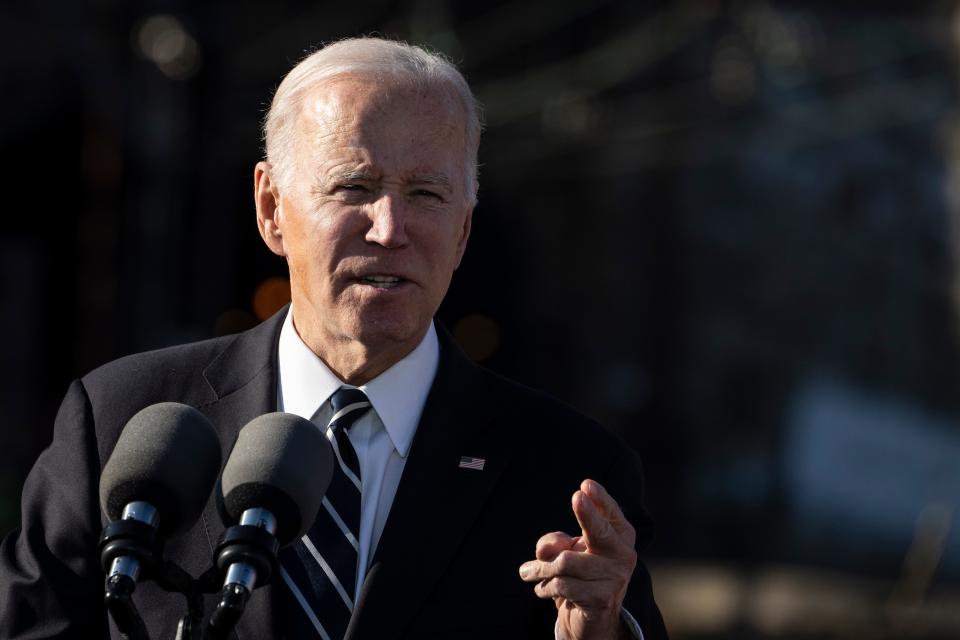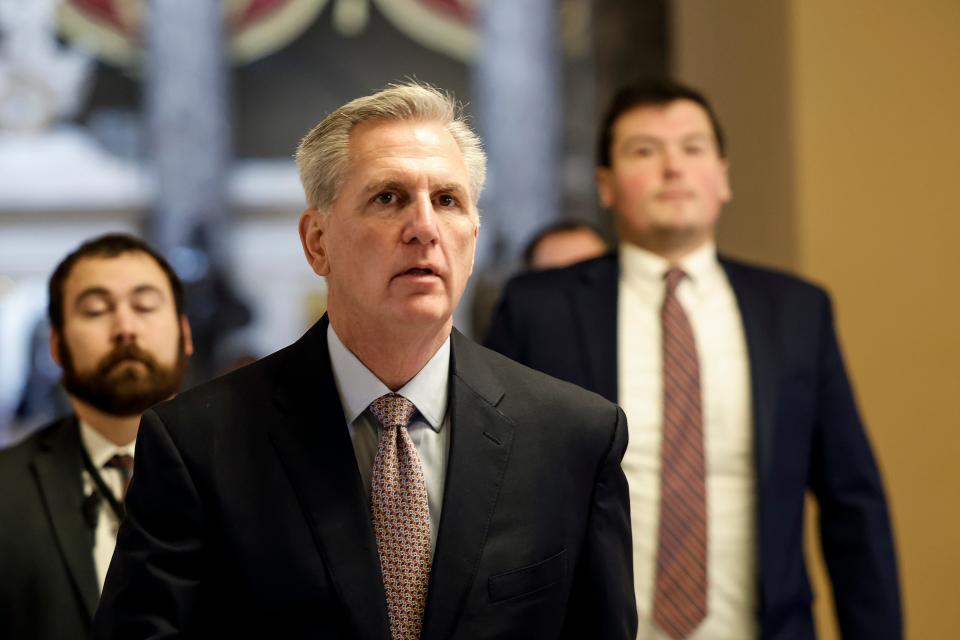Amid debt ceiling standoff, why Joe Biden is refusing to negotiate with Republicans
WASHINGTON – As President Joe Biden welcomes Republican House Speaker Kevin McCarthy for a highly anticipated one-on-one meeting Wednesday, the White House is making one thing clear: There will be no negotiations on the debt ceiling.
Biden has drawn a hard line against entertaining spending cuts pushed by House Republicans amid their brinkmanship on raising the amount the U.S. can borrow.
It reflects a broader White House strategy. When Republicans reveal the domestic programs they want to cut, the White House is counting on the move proving so unpopular that enough House Republicans will abandon their demands for Congress to act.
More: What happens if the US hits the debt ceiling? Here's what to expect if we reach debt limit.
The latest on the debt limit fight and timeline
'Extraordinary measures': The U.S. hit the $31.8 billion ceiling limit Jan. 19 on how much the federal government is allowed to borrow, prompting Treasury Secretary Janet Yellen to take "extraordinary measures" to pay the nation's bills amid inaction by Congress.
Uncertainty beyond June: Although it's unclear how long the Treasury Department can avoid defaulting on the debt, the government is expected to be able to keep operating until at least early June.
GOP targets spending: McCarthy and House Republicans are looking to eliminate what they call "wasteful spending in Washington" as part of a deal to raise the debt ceiling. But they've not presented a unified plan identifying which programs they want cut.
A potential 'calamity': Biden has warned of an economic "calamity" if Congress fails to raise the debt limit and the U.S. goes into default for the first time. Economists warn it could plunge the economy into a deep recession.
More: House Speaker McCarthy to meet President Biden on Wednesday to discuss debt ceiling, spending cuts
Lessons from 2011: Inside the White House strategy
Biden and Democrats are haunted by the debt ceiling standoff of 2011, when then-Vice President Biden in the Obama presidency convened a bipartisan group of lawmakers as Republicans in a new GOP-controlled House demanded deficit reduction.
Although a full-scale crisis including default was averted when Obama agreed to $2 trillion in spending cuts, there was damage nonetheless: The U.S. experienced its first credit rating downgrade and the stock market plunged.
Obama and Biden learned a lesson and made a pledge, according to a White House official: Never again negotiate to raise the debt limit.

In turn, McCarthy is pointing to the same talks 12 years ago to make the case that negotiations over spending cuts should take place again.
"He literally led the talks in 2011 and he praised having those talks," McCarthy said Sunday on CBS' "Face the Nation" when asked whether he believes Biden will look at spending. "This is what he's always done in the past."
But the White House cites congressional precedent to argue the debt limit should be lifted without conditions.
Congress has raised the debt ceiling 78 times since 1960, White House officials like to note, including 49 times under Republican presidents, 29 times under Democratic presidents and during divided governments like today.
Three of those times came when Donald Trump was president with votes from Republicans and Democrats in Congress.
Takeaways
The White House is daring McCarthy and Republicans to reveal a plan for spending cuts.
"Show me your budget, I'll show you mine," Biden said Monday ahead of his meeting with McCarthy.
Until Republicans do, expect Biden to keep warning that Medicare and Social Security could be on the chopping block, even though McCarthy has vowed neither program will be touched.
As the risk of default draws closer in the months ahead, the Biden administration believes Americans will view the Republican brinkmanship more unfavorably – as willing to jeopardize the economy and cut popular programs for ideological goals.

McCarthy, in the same interview Sunday on "Face the Nation," said, "We're not going to default."
But McCarthy faces pressure to satisfy concerns of hard-line conservatives in his caucus, who stalled his election as speaker earlier this year and now want spending concessions.
For Biden, it's a major risk to assume House Republicans will be the first to blink.
More: Biden says GOP 'threatening to destroy' economy over debt ceiling
What Biden plans to ask McCarthy
In a memo Tuesday, the White House outlined two questions Biden will pose to McCarthy. 1. "Will the Speaker commit to the bedrock principle that the United States will never default on its obligations?" 2. "When will Speaker McCarthy and House Republicans release their Budget?"
Biden will release his budget March 9, according to the memo from Brian Deese, director of the National Economic Council, and Shalanda Young, director of the Office of Management and Budget.
Conservative lawmakers have shown no signs of budging. "We're 31+ trillion in debt and the Biden White House still wants us to raise the debt ceiling," Rep. Andy Biggs, R-Ariz., said in a tweet Monday. "If we can't say no now, when else can we?"
Why it matters
Raising the debt ceiling has emerged as Biden's first major fight in a divided Congress, and the fate of the economy could be at stake.
Economic repercussions would quickly mount, putting the nation at risk of a deep recession, if the Treasury Department is unable to pays its obligations, according to the Brookings Institution. Even if an impasse is quickly resolved, more than 2.5 million jobs could be lost if the debt ceiling isn't lifted, a 2013 study from Macroeconomic Advisers found.
More: U.S. hits debt ceiling. Amid fears of debt default, Treasury begins 'extraordinary' measures
Some financial experts say the White House could have options to raise the debt limit unilaterally, without congressional action. The Washington Post broke down some of the maneuvers that include far-fetched ideas such as minting a new platinum coin, breaking the debt limit by citing other federal spending laws, or invoking the 14th Amendment and its requirement of equal protection for all citizens.
For now, the White House isn't discussing any plan B to raise the debt ceiling. Instead, it appears convinced it can win a standoff with Republicans.
Reach Joey Garrison on Twitter @joeygarrison.
This article originally appeared on USA TODAY: In debt ceiling talks, Biden reaffirms he will not negotiate with GOP

 Yahoo Movies
Yahoo Movies 
